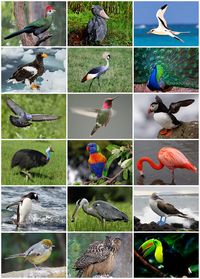
Call‐specific patterns of neural activation in auditory processing of Richardson’s ground squirrel alarm calls
Sign Up to like & getrecommendations! Published in 2020 at "Brain and Behavior"
DOI: 10.1002/brb3.1629
Abstract: Richardson's ground squirrels use alarm calls to warn conspecifics about potential predatory threats. Chirp calls typically indicate high levels of threat from airborne predators, while whistle calls are associated with lower levels of threat from… read more here.
Keywords: alarm calls; alarm; richardson ground; activation ... See more keywords

Deconstructing the landscape of fear in stable multi-species societies.
Sign Up to like & getrecommendations! Published in 2017 at "Ecology"
DOI: 10.1002/ecy.1935
Abstract: Animal distributions are influenced by variation in predation risk in space, which has been described as the "landscape of fear." Many studies suggest animals also reduce predation risk by eavesdropping on heterospecific alarm calls, allowing… read more here.
Keywords: alarm calls; alarm; deconstructing landscape; landscape fear ... See more keywords

Lack of alarm calls in a gregarious bird: models and videos of predators prompt alarm responses but no alarm calls by zebra finches
Sign Up to like & getrecommendations! Published in 2017 at "Behavioral Ecology and Sociobiology"
DOI: 10.1007/s00265-017-2343-z
Abstract: Many vertebrates use vocalizations to communicate about the presence of predators, and some encode information about predator type or behavior. A fast-approaching predator typically elicits a “flee alarm call,” prompting others to escape to safety.… read more here.
Keywords: alarm calls; alarm; zebra finches; alarm call ... See more keywords

Receivers matter: the meaning of alarm calls and competition for nest sites in a bird community
Sign Up to like & getrecommendations! Published in 2018 at "Oecologia"
DOI: 10.1007/s00442-018-4139-x
Abstract: Animal communities may constitute information networks where individuals gain information on predation risk by eavesdropping on alarm calls of other species. However, communities include species in different trophic levels, and it is not yet known… read more here.
Keywords: competition nest; alarm; bird community; nest sites ... See more keywords

Eavesdropping in an African large mammal community: antipredator responses vary according to signaller reliability
Sign Up to like & getrecommendations! Published in 2018 at "Animal Behaviour"
DOI: 10.1016/j.anbehav.2017.12.018
Abstract: Alarm calls can provide nontarget receivers with potentially life-saving information on predation risk. However, patterns of eavesdropping among species may be shaped by the reliability of the intercepted information, that is, the degree to which… read more here.
Keywords: reliability; community; alarm calls; antipredator responses ... See more keywords

Birds orient their heads appropriately in response to functionally referential alarm calls of heterospecifics
Sign Up to like & getrecommendations! Published in 2018 at "Animal Behaviour"
DOI: 10.1016/j.anbehav.2018.04.010
Abstract: Vertebrate alarm calls signal danger and often encode graded or categorical information about predator proximity or type. In addition to allowing communication with conspecifics, alarm calls are a valuable source of information for eavesdropping heterospecifics.… read more here.
Keywords: functionally referential; alarm; information; response ... See more keywords

Working hypotheses on the meaning of general alarm calls
Sign Up to like & getrecommendations! Published in 2018 at "Animal Behaviour"
DOI: 10.1016/j.anbehav.2018.06.008
Abstract: General calls are present in the vocal repertoire of a great number of animal species. Because of their lack of context specificity, they are typically argued to possess blurred meaning, or even no meaning at… read more here.
Keywords: working hypotheses; general alarm; hypotheses meaning; alarm calls ... See more keywords

Eavesdropping magpies respond to the number of heterospecifics giving alarm calls but not the number of species calling
Sign Up to like & getrecommendations! Published in 2019 at "Animal Behaviour"
DOI: 10.1016/j.anbehav.2018.12.012
Abstract: Social information varies in its reliability and relevance, requiring individuals to use rules to avoid inappropriate responses to false information. A simple rule is to respond only when a certain number of individuals provide similar… read more here.
Keywords: information; magpies respond; number; alarm calls ... See more keywords

Dialects in the alarm calls of black- tailed prairie dogs (Cynomys ludovicianus): A case of cultural diffusion?
Sign Up to like & getrecommendations! Published in 2020 at "Behavioural Processes"
DOI: 10.1016/j.beproc.2020.104243
Abstract: Prairie dogs (Cynomys spp.) produce an alarm call when a predator appears. Gunnison's prairie dogs (Cynomys gunnisoni) produce calls that vary in spectral structure according to predator type and specific characteristics unique to the individual… read more here.
Keywords: dogs cynomys; black tailed; cynomys ludovicianus; alarm calls ... See more keywords

Anthropogenic noise alters dwarf mongoose responses to heterospecific alarm calls.
Sign Up to like & getrecommendations! Published in 2017 at "Environmental pollution"
DOI: 10.1016/j.envpol.2017.01.049
Abstract: Anthropogenic noise is an evolutionarily novel and widespread pollutant in both terrestrial and aquatic habitats. Despite increasing evidence that the additional noise generated by human activities can affect vocal communication, the majority of research has… read more here.
Keywords: anthropogenic noise; alarm; information; heterospecific alarm ... See more keywords

Warblers perform less nest defense behavior and alarm calls to human intruders: A result of habituation
Sign Up to like & getrecommendations! Published in 2020 at "Global Ecology and Conservation"
DOI: 10.1016/j.gecco.2020.e01187
Abstract: Abstract Human disturbance is caused by the anthropogenic activities in the environment. While human threat to wildlife is considered to be complex (nonlethal recreations and lethal hunting activities). To date, there has been few studies… read more here.
Keywords: human disturbance; defense; alarm calls; defense behavior ... See more keywords